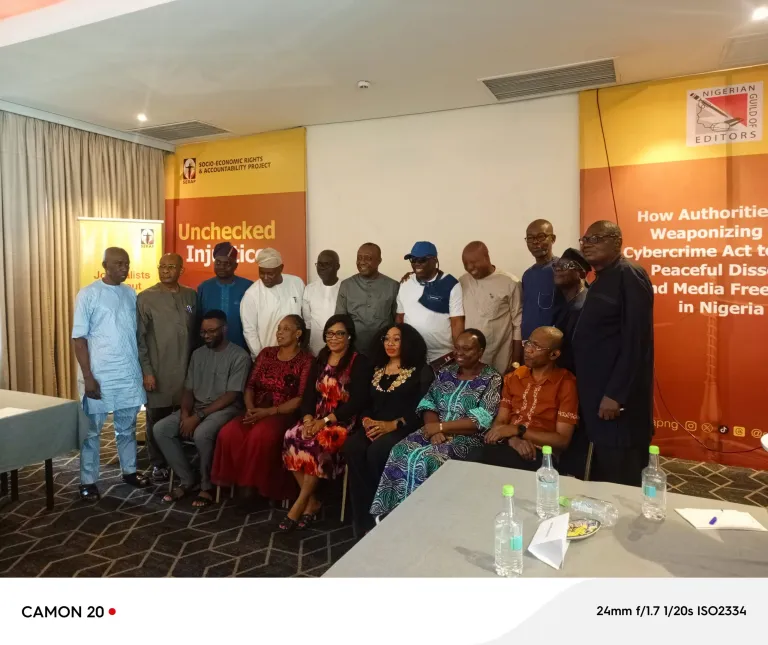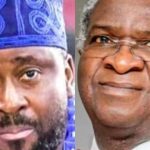...To get all news updates, Join our WhatsApp Group (Click Here)
Also Join our WhatsApp Channel (Click Here)
The Socio-Economic Rights and Accountability Project (SERAP) and the Nigerian Guild of Editors (NGE) have urged President Bola Tinubu and the National Assembly to repeal Cybercrime (Prohibition, Prevention, etc.) Act, citing its use by authorities to harass journalists, bloggers, activists, and critics across Nigeria.
Speaking at a press conference in Lagos on Saturday to commemorate World Press Day, Kolawole Oluwadare, deputy director of SERAP, and Iyobosa Uwugiaren, general secretary of the NGE, raised concerns over the continued misuse of the Act particularly Section 24 on cyberstalking by law enforcement agencies to clamp down on dissent and press freedom.
“We urge the Attorney General to advise President Bola Tinubu to promptly obey all outstanding court judgments, including the ECOWAS Court judgement directing the Federal Government to repeal the repressive Cybercrimes Act and bring it in conformity with Nigeria’s international human rights obligations and commitments.
“Authorities at all levels are using the Cybercrime Act and regulations disguised as broadcasting codes to intimidate journalists and critics,” Mr Oluwadare said.
Mr Oluwadare stated that the silent actions of both federal and state governments have worsened the pattern of repression, arbitrary arrests, malicious prosecutions, and unlawful detentions targeting those exercising their right to freedom of expression.
“Authorities at all levels are using the Cybercrime Act and regulations disguised as broadcasting codes to intimidate journalists and critics,” Mr Oluwadare said.
“These actions reflect a worsening pattern of repression, arbitrary arrests, malicious prosecutions, and unlawful detentions targeting those exercising their right to freedom of expression.”
He emphasised that the 2024 amendment of the Act failed to address the concerns raised by the ECOWAS Court of Justice in a March 2022 ruling, which declared Section 24 arbitrary, vague, and in violation of Article 9 of the African Charter on Human and Peoples’ Rights and Article 19 of the International Covenant on Civil and Political Rights.
Mr Oluwadare said despite the amendment, the redefined offence of cyberstalking remains broad, vaguely worded, and susceptible to abuse.
He explained that Section 58, for example, defines cyberstalking as “a course of conduct directed at a specific person that would cause a reasonable person to feel fear”—a formulation critics say gives authorities wide discretion to suppress speech.
‘Cybercrime Act – tool for oppression’
“The Act continues to be used as a tool of repression,” he said. “Stories published online even when factual have been deemed offensive or annoying and subjected to criminal prosecution. Journalists are being targeted simply for doing their jobs.”
He stressed that Nigeria dropped 10 places to 122nd in the 2025 World Press Freedom Index released by Reporters Without Borders.
He stated that the Centre for Journalism Innovation and Development (CJID) recorded 110 verified press attacks in 2024, surpassing the total for all of 2023.
He mentioned that Freedom House’s 2023 and 2024 reports noted a decline in internet freedom and an increase in arbitrary arrests of bloggers and journalists.
He added that multiple journalists were detained in 2024 under cyberstalking or defamation provisions including Daniel Ojukwu of the Foundation for Investigative Journalism (FIJ) who was held for ten days over a corruption report.
ICIR reporters Nurudeen Akewushola and Dayo Aiyetan were interrogated for nine hours in an attempt to uncover their sources and reporters from News Central TV, Daily Independent, TheCable, and Punch were harassed or assaulted while covering protests in Lagos, Abuja, and Borno.
“These actions not only violate press freedom and human rights but also flout court orders,” Mr Oluwadare said. “The impunity enjoyed by perpetrators exacerbates the hostile environment for media and civil society.”
Demands
Mr Uwugiaren stated that the two organisations outlined several demands including an immediate suspension of the Cybercrime Act’s enforcement by law enforcement agencies.
He called for a comprehensive review of the Act and other repressive laws to align them with the Nigerian Constitution and international obligations.
He demanded the unconditional release of all persons detained solely for peaceful expression.
He demanded that President Tinubu tell state governors and security agencies to respect human rights and press freedom.
He called for a thorough, transparent investigation into violations against media workers and activists.
He stated that obedience to all outstanding court judgements, including the ECOWAS Court ruling on Section 24, and a halt to proposed laws seeking to further regulate social media or restrict civil society.
“We urge the National Assembly to drop all bills targeting free speech and instead prioritise legislative reforms that safeguard civic space,” said Mr Uwugiaren. “We also call on the international community to hold Nigerian authorities accountable and press for urgent legal reforms.”
Condemnation of Cybercrime Act
Speaking on the sidelines of the event, Martins Onoja, former Managing Director and Editor-in-Chief of The Guardian newspaper, described Section 24 of the Cybercrime Act as “ambiguous and vague,” allowing state authorities to arbitrarily detain individuals for expressing dissent.
“The section gives room for security agencies and state actors to simply arrest anyone they do not like, even when no clear offence has been committed,” Mr Onoja said.
“This is dangerous for democracy. The Constitution already provides legal remedies for defamation or libel. There is no need to detain people using the police simply because they expressed themselves online.”
Mr Onoja criticised what he described as the increasing trend of using cyberstalking provisions to silence critical voices, pointing to broader failures in governance that citizens have a right to question.
“There’s food inflation, collapsing enterprises, soaring transport costs — people are entitled to complain,” he said.
“But instead of addressing the substance of these complaints, leaders rely on vague legal tools like Section 24 to suppress public expression.”
He also decried the lack of public input in the legislative process, lamenting that National Assembly decisions are often taken without consultation.
He cited the naming of a National Assembly library after a sitting president as a sign of deepening executive overreach and a breakdown in the separation of powers.
“We’re not asking for a favour. This is about defending democracy. When public officers fail, citizens have a constitutional right to speak up, not to be silenced,” he said.
Also speaking at the event, the President of the Nigerian Guild of Editors (NGE), Eze Anaba, said the Cybercrime Act is increasingly used to criminalise journalism.
“Instead of discussing how Nigerian media can rise to international standards, we’re forced to talk about how security agencies are repressing the press,” Mr Anaba said.
“All a powerful person has to do is make a call, and a journalist is arrested or abducted sometimes by police, sometimes by the military.”
He argued that Nigeria’s legal system already includes sufficient laws, such as those on libel and defamation, to deal with misinformation and fake news.
He stressed that the continued use of the Cybercrime Act to arrest journalists violates Section 22 of the Nigerian Constitution, which mandates the media to hold the government accountable.
“There’s no perfect media anywhere, but using draconian laws like this stifles progress and undermines accountability,” he said.
Echoing these views, Executive Director of DAAR Communications Plc, Imoni Amarere, described the Cybercrime Act as a threat to democratic freedoms.
“The Act criminalises even the air we breathe,” Mr Amarere said. “In a democracy, we cannot criminalise criticism. The right to question government actions is fundamental.”
He argued for the complete repeal — not just amendment — of the Act, citing court rulings that have invalidated parts of it.
“The Act contradicts the Nigerian Constitution and international human rights obligations. A responsible government should obey those court rulings and repeal it entirely,” he said.
The Cybercrime Act passed in 2015 and later amended in 2024, has been a point of criticism by rights groups who say its vague language allows for abuse.
Section 24, which addresses cyberstalking and online harassment, is most frequently cited in arrests of journalists and activists.
You can get every of our news as soon as they drop on WhatsApp ...To get all news updates, Join our WhatsApp Group (Click Here)
Also Join our WhatsApp Channel (Click Here)












